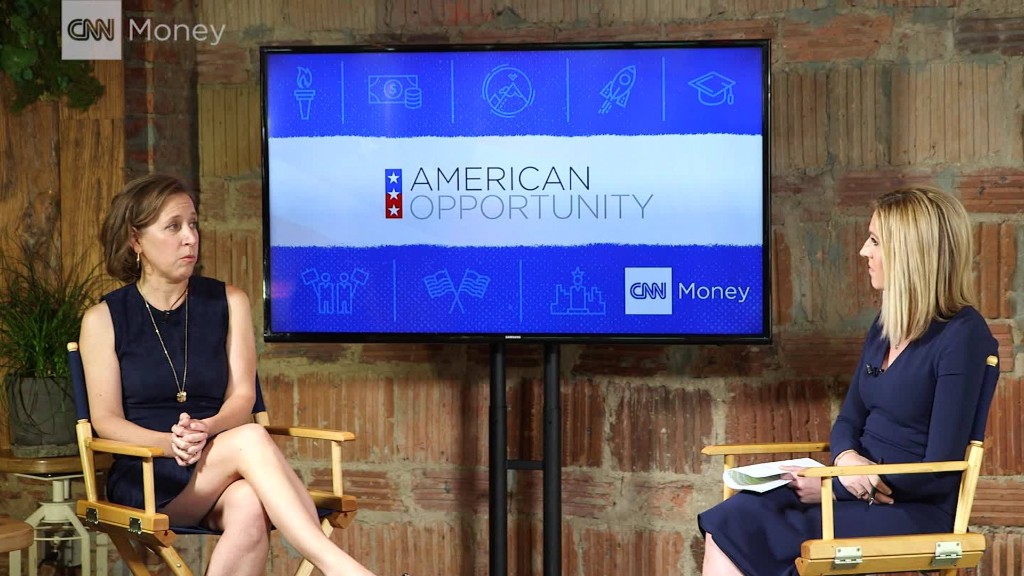
Lauren Reynolds was excited to return to work after having a baby. But she was also terrified to leave her 4-month old daughter.
"You spend 12 weeks trying to keep the baby alive and function normally," she said. "I was excited and scared for what it meant for me and my family."
Through a phase-back program offered by her employer, advertising agency Leo Burnett Group, Reynolds was allowed to ease back into the workforce. New moms can work at a 60% schedule the first month and 80% the second month. Salaries are adjusted accordingly.
While the reduced schedule is optional, it helped Reynolds figure out her new role of working mom.
"It was hugely beneficial to me mentally so I could feel like I was being an effective mother to my newborn , get comfortable with child care and get reacclimated with my team and projects. I felt I was prepared to step back in 100% after the transition period."
New mom, new life, new reality
Returning to work is hard on new mothers. Even if the plan was always to continue working full time after birth, finding a balance between work and parenting is difficult.
"It can be really hard on a mom to go from staying at home with a newborn who demands a lot of attention, still learning how to breastfeed and not sleeping at night, to go immediately back to work," said Audrey Kingo, senior editor at Working Mother.
Even though the US remains the only developed nation that does not mandate some sort of paid leave to new mothers, companies have increasingly been taking matters into their own hands. They're also adding other benefits like gradual return to work programs, lactation rooms and more flexible schedules.
Other companies like Vodafone and law firm Finnegan, Henderson, Farabow, Garrett & Dunner also offer return to work programs. Netflix (NFLX) gives parents a lot of flexibility when returning to work as well. The company offers unlimited paid leave for new parents during the first year, and allows them to return part time, full time, or come and go as needed.
"It's in companies' best interest to have employees 100% committed to doing their jobs to the best of their abilities," said Kingo. "When a mom feels comfortable, she can put in 100% at the time she is at the office."
Leo Burnett has been offering the phase-back program since 2014 and said it's helped give the company an advantage in a competitive market. "It's zero cost to us, only benefit," said Billie Smith, chief talent officer.
Some companies offer flexibility to new mothers if they ask, but experts said it is crucial companies have a formal program.
"A lot of moms are very nervous to ask for more benefits ... the mother penalty is very real," said Kingo. "There is the fear they will hold it against you when it comes time for raises and promotion."
Erin Stach, an attorney in Chicago, remembers being nervous asking for a reduced schedule from her employer when she had her first kid in 2015. "I was absolutely terrified. To be honest, I was terrified to tell him I was pregnant."
She explained to her supervisor that she didn't want to return to a "crazy schedule" and instead cut back to a 70% reduced schedule. The company accommodated her request, and she did the same modified schedule after her second baby.
Making it official
Not having official policies and programs in place for new parents can mean losing workers.
Mother of two Arielle Mir had to negotiate her return-to-work plan after having her first baby in in 2012.
"I for sure had bosses who were understanding and they were accommodating, but it feels different to have official support than just support that you have an understanding manager."
After a while, she decided to look for a job that offered more flexibility.
She accepted a new position with a healthcare technology company that allowed her to work remotely with a more flexible schedule the day before she found out she was having another baby.
"It makes a pretty big difference knowing that there was someone else thinking about how to smooth out the edges. It takes a lot of emotional and mental energy to come back to work and figure out logistics, and when someone says, 'no problem, of course we will do that,' it makes it easier."
The work-life dance can get even more complicated after baby number two. "After the first son, I found it difficult to come back to work," said Lori Mihalich-Levin. "For the second, it was a real struggle." She looked for help online on how to manage the return, but came up empty handed.
So in 2014, she created an organization called Mindful Return, a four-week online program for new parents on how to make the transition as smooth and efficient as possible.
"The transition period is critical," she said. "It takes time to get back into projects."
